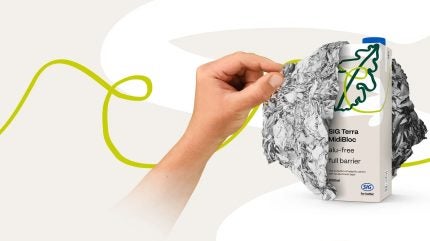
SIG has revealed the commercial launch of its latest advancement, the ‘Terra Alu-free + Full barrier’ solution for multi-serve aseptic cartons.
Following the success of its aluminium-layer-free packaging for single-serve cartons, SIG is set to expand this technology for multi-serve uses.
The company noted that its packaging design leads to a reduction in the carbon footprint of standard aseptic cartons by as much as 61% when paired with forest-based polymers.
The barrier material consists of more than 80% paper, streamlining the packaging structure to just two primary raw materials sourced from renewable origins.
Even without the aluminium, the new packaging reportedly provides the same full barrier protection as conventional aseptic cartons. It ensures a shelf life of up to 12 months, guaranteeing that product quality remains intact.
SIG added that its new solution can be integrated into current carton filling lines with only minor adjustments needed.
These filling lines can achieve better speeds of up to 24,000 packs per hour for small-size cartons and 15,000 packs per hour for multi-serve cartons.
Since 2010, SIG has distributed more than four billion packs that do not contain an aluminium layer, solidifying its role in sustainable aseptic packaging.
SIG chief technology officer Gavin Steiner said: “Sustainability is integral to our business, and we strive to create a regenerative food packaging system.
“Looking ahead, SIG plans to raise the paper content in its aseptic cartons to at least 90% including closures by 2030, with an interim target of 85% without closure this year – further boosting renewability, lowering carbon footprints, and with the potential to streamline the recycling process for aseptic cartons, only requiring the separation of paperboard and polymers.”
Earlier this month, SIG InnoVentures and Optima announced an investment in PulPac.







